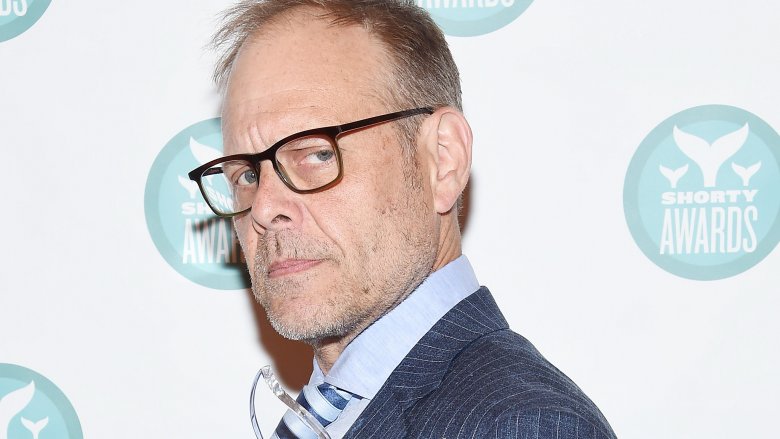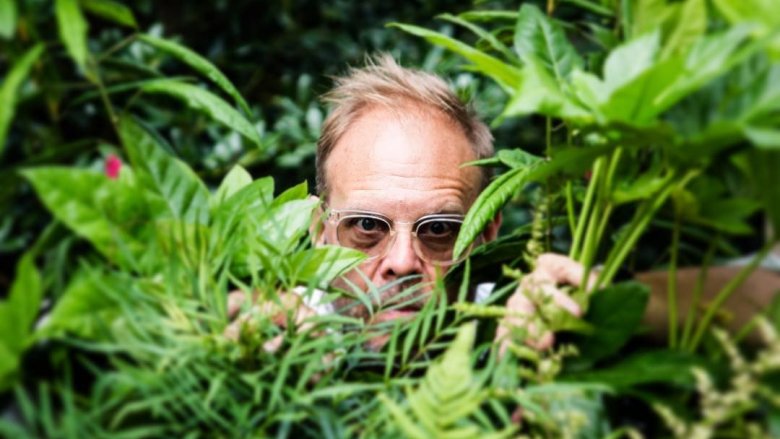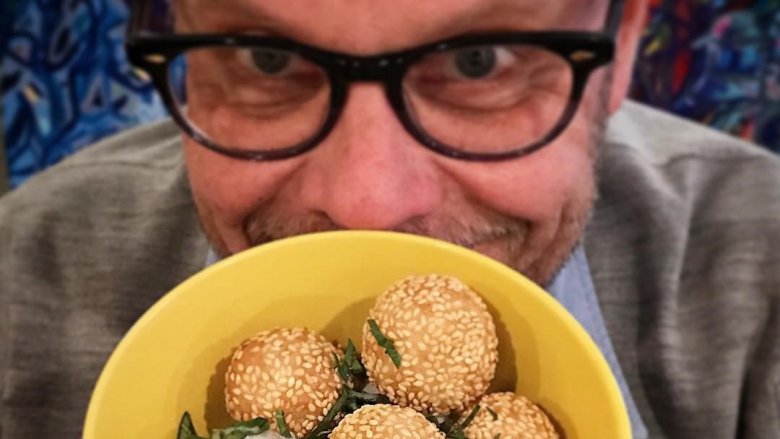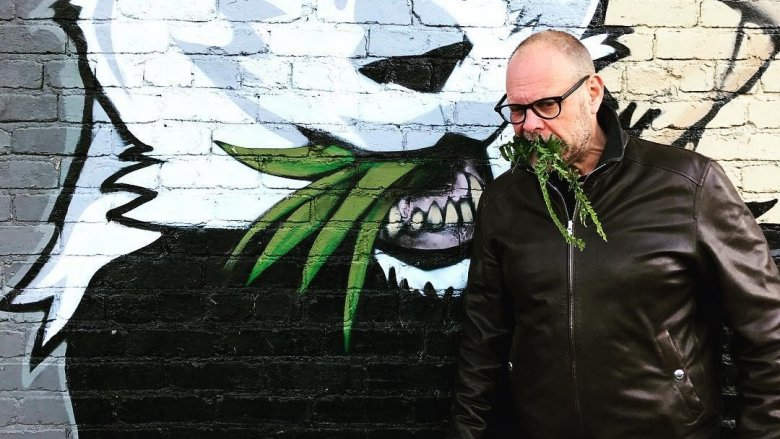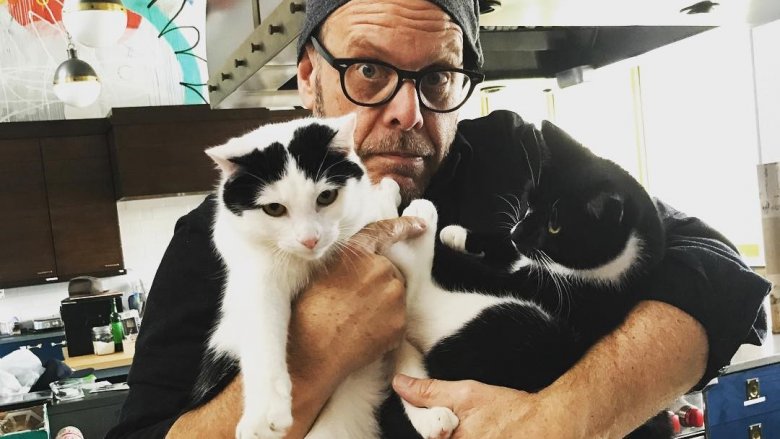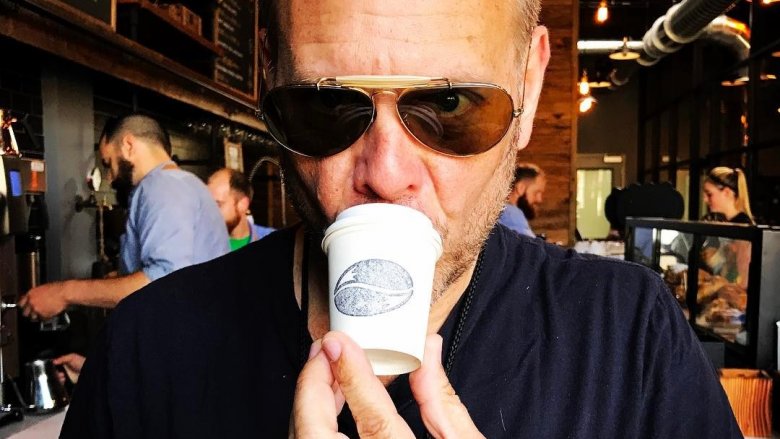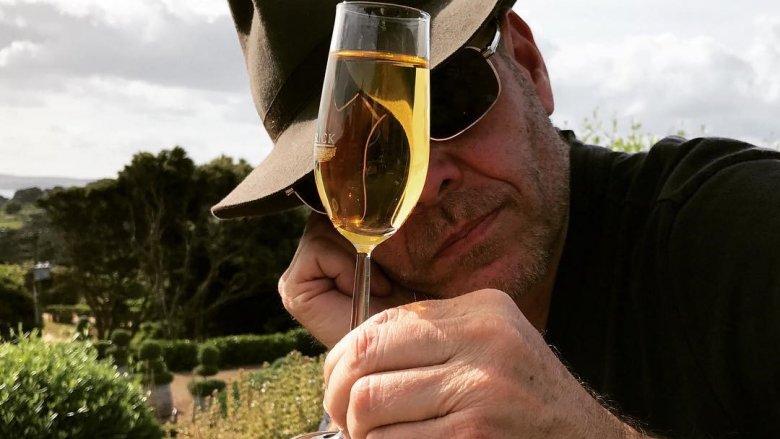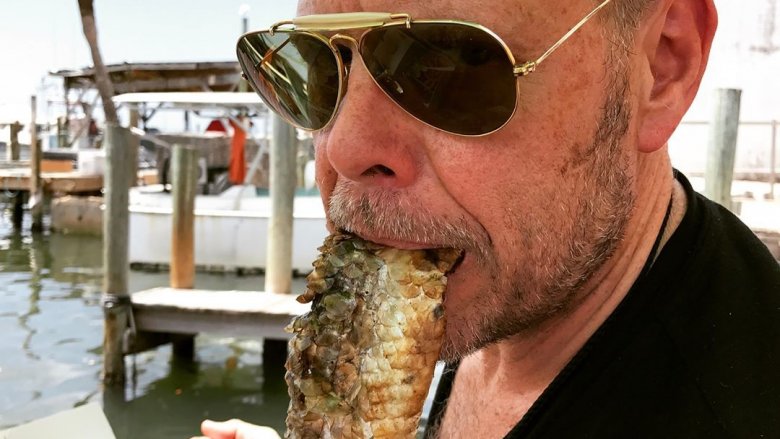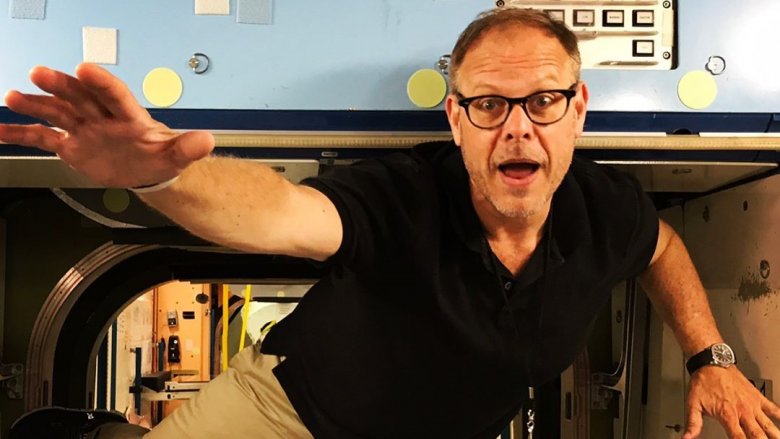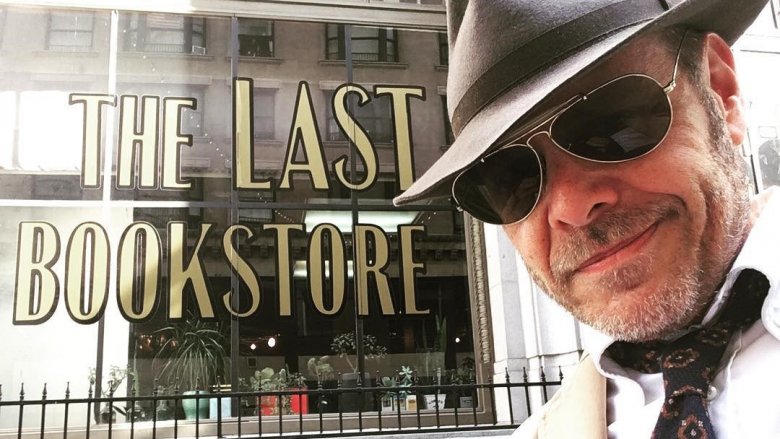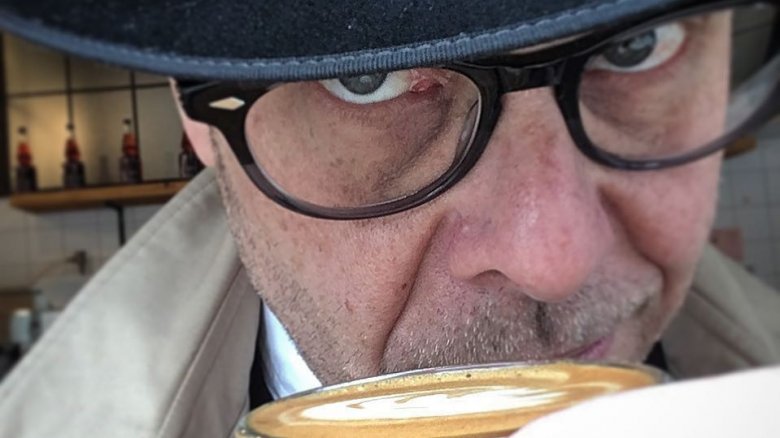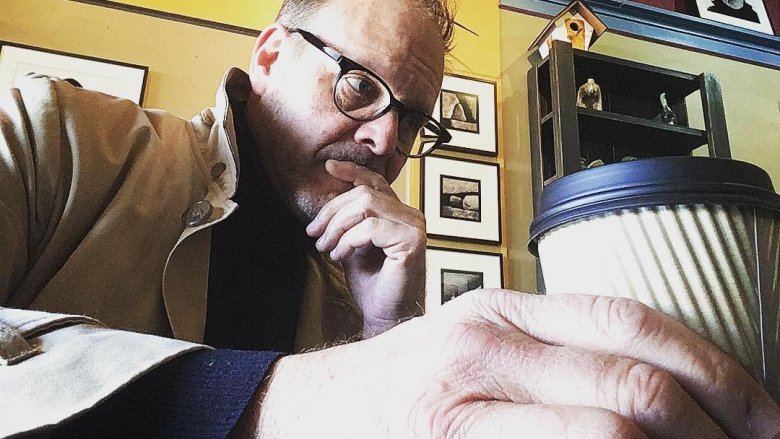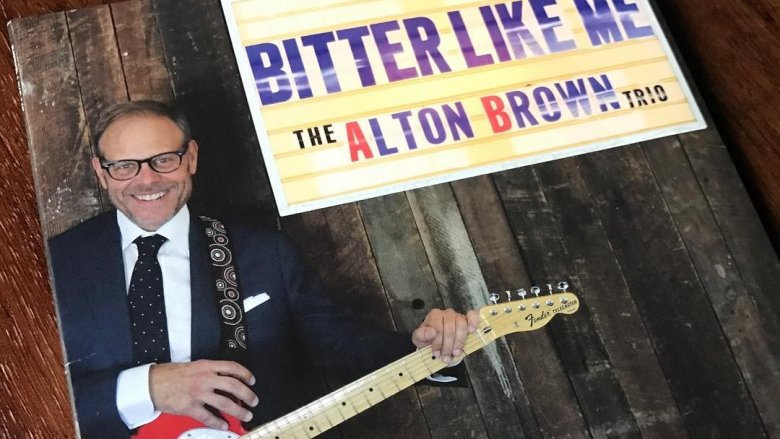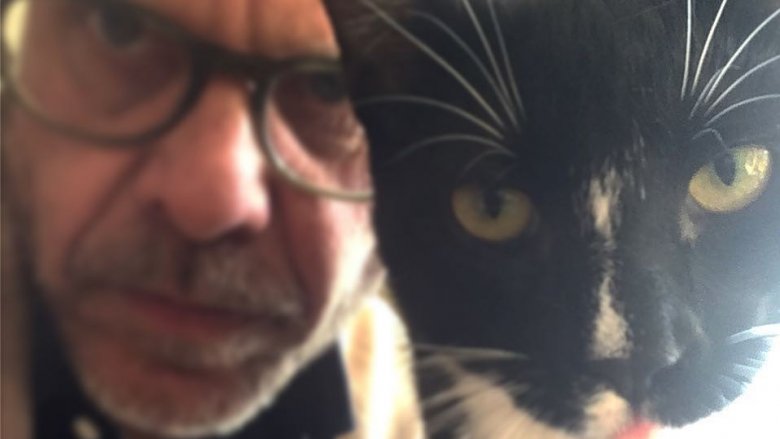The Untold Truth Of Alton Brown
We may receive a commission on purchases made from links.
Alton Brown is a complicated guy. Former New York Times reporter (and author of From Scratch: Inside the Food Network) Allen Salkin said of him, "I think he's the greatest genius that Food Network ever hired..."
Fans would agree. At the same time Brown presents food in a scientific, technical, and sometimes over-the-top, geeky sort of way, he also manages to do it in a way that's not just informative, but accessible. Good Eats wasn't just good entertainment, it got countless people into the kitchen, explained the "why" along with the "how," and gave a whole new perspective to cooking. Sure, fans love to see him hosting a show that features other chefs, but what we all really want is him back in the solo spotlight. In late 2017, Variety reported that just might happen. So, before he's back on your screen, what should you know about Food Network's smartest showman?
He had a complicated childhood
When The New York Times got Brown talking in 2016, they noted it was something of a rarity. He's more likely to be what they called a "controlled showman than a freewheeling chef," and they also commented on his tendency to value his privacy. That notoriously private nature made the insights into his childhood even more surprising.
Born in Los Angeles, he and his family moved to Georgia when he was 7. It was only a few years later — on his very last day of the sixth grade — that his father died. He was found suffocated in their home, and while the police officially ruled his death a suicide, Brown says he had always believed it was entirely possible he'd been murdered.
Brown was left with his mother, and says she went on to marry four more times. He added that he doesn't have much to do with his myriad of step siblings or his mother, describing his relationship with her as holding at "a 100-mile distance," and saying, "My mom didn't have a lot of respect for me until I became famous."
He thought cooking was boring
Alton Brown told the Bitter Southerner that he graduated high school at 16, after getting what he described as the worst possible education imaginable. He eventually ended up in Atlanta with a job directing TV commercials, where he got his first exposure to cooking shows. It wasn't a pleasant experience.
"I remember I was watching food shows, and I was like, 'God, these are boring. I'm not really learning anything.' I got a recipe, OK, but I don't know anything."
So, he sat down and came up with his own formula for a cooking show that would be honest-to-gosh good. "I remember writing down one day: Julia Child / Mr. Wizard / Monty Python." He wanted the knowledge of Julia Child, the how and why of Mr. Wizard, and the humor of Monty Python, all wrapped up around food. That should all sound familiar to fans of Good Eats, a show that only came after he changed his career path and headed to the New England Culinary Institute in Vermont. A big step? Absolutely, and he says, "Everybody thought I was insane... But I knew I wasn't doing what I was supposed to be doing."
Iron Chef annoys him... just a bit
Watch Brown on Good Eats, and you might get the feeling he might not be entirely comfortable playing second fiddle to anyone. But he does, on Iron Chef America, and he told Eater that his role as critic, narrator, and subordinate doesn't always sit well with him.
"When the chairman is there, I'm playing another role, of subordinate, which chafes me just a little bit. It's a fine line, and I never actually know if I get it. I really don't know how I come off," he says.
But don't get him wrong, that unease doesn't extend to the guy who's actually playing the Chairman. His name is Mark Dacascos, and Brown calls him "one of my top ten favorite people on Earth." He adds that in real life, he's absolutely nothing like his on-screen persona at all, and behind the scenes, they're "just having fun to the best of our ability."
He's weighed in on the pineapple-pizza debate
It's one of the culinary world's age-old questions: Should pineapple be put on pizza? In 2017, Gordon Ramsay threw his opinion on the side of "absolutely not," although his version of the answer actually had more expletives.
Alton Brown entered the fray, too, and responded with a Tweet we can all actually get behind: "If I want pineapple on my pizza, I'll by God have it."
People reached out to him, and he clarified. Even though he says he's a bit of a traditionalist when it comes to his own pizza preferences (cheese, one green thing, and "some salty meat product"), he also says he's not about to tell anyone else whether their own personal pizza preferences are right or wrong. There's plenty of room in the world for people who like all different kinds of things, and he added, "I don't think anybody gets to be a Pizza Nazi. You can have whatever you want on it." Case closed.
He had no idea what he was talking about
Alton Brown makes being smart look pretty effortless, but when he first started on Iron Chef America, he says he didn't have the foggiest idea what half the ingredients were. He'd already been doing Good Eats for a few years, but still told the Bitter Southerner that when he got the call for Iron Chef, he agreed, showed up on set, and was dumbfounded.
"I showed up to do that job, it's like, 'What the hell is any of this stuff?' ... I'm like, 'I shop at Kroger, OK?' You don't get 16 different kinds of freaking kelp at Kroger."
Brown says it was a huge learning curve, especially considering they started out shooting two episodes a day. He needed to learn so much, so fast, and talk about it on the fly that he said he would get home at night and not remember a thing they cooked, used, or that he talked about. "As soon as I was done using it, I flushed it."
He has a nerdy sort of diet plan
There are a million different ideas out there on the best way to manage or lose weight, and Best Self talked to Alton Brown about his 50-pound weight loss and how he did it. As you might expect, he took a scientific approach to adjusting his lifestyle: he made some lists.
"Having wrestled with weight my whole life, I knew that a diet based on denial ... would ultimately fail for me," he said. "I knew if I was going to design a plan that had any hope of success, it would have to be based on not the things I couldn't eat but things I had to eat, because that's more proactive."
Brown broke his entire eating plan into four lists: foods to eat daily (like leafy greens, nuts, and green tea), foods to eat three times a week (like yogurt, sweet potato, and oily fish), a once-a-week list (desserts and alcohol), and a never list. That was stuff like fast food and canned soup, and Brown says it helped him re-focus the idea of dieting into something that worked, instead of something that felt like work.
He has some cringy views on obesity
Brown has gone on record as saying he's had a lifelong struggle with his weight, but when it comes to his views on obesity, they're pretty harsh. In 2008, he spoke with the East Bay Times about the number of overweight fans who approached him to tell him they loved Food Network.
"Well, no (expletive); did you eat the TV? There's only four of you and you can't ride in an elevator together. I'll probably make fat people angry, but we need, as a culture, to be ashamed," he said.
Ouch. It's not surprising he got some serious fallout for those comments, and when he talked to The New York Times (via Salon) in 2015 he was a little more in-touch with the very real struggle many people face. He acknowledged it was usually cheaper to feed a family on fast food and junk than with healthy, nutritious foods, and he called the divide "nutritional slavery." He still went on to say, though, that "Obesity is not a disease," and said every person needs to take responsibility for their weight and what they eat.
He's big into sustainable seafood
In 2008, Brown attended the Cooking for Solutions conference (via Grist), and said that he felt he needed to start paying a penance. He had realized he hadn't focused enough on sustainability, and in honor of his childhood hero — Jacques Cousteau — he was going to start talking more about how we're not just responsible for feeding ourselves, but for the animals we use to do just that.
And, also for Cousteau, he decided to focus on the oceans and sustainable fishing. "Somebody's got to get serious about what's happening to the oceans," he said. "Somebody needs to sink the Japanese tuna fleet. Everyone's willing to point the finger, but nobody's willing to pull the trigger."
Brown says it's about finding a Zen-like balance, about asking the right questions, and bringing the concepts of sustainability down to a local level where each person can feel they have an impact. To those ends, he told the East Bay Times the world has a lot to learn from Alaska's sustainable fishing practices. "We have the information to make good choices," he said. "Let's make it a mission..."
He had a total change of heart
If Alton Brown seems like an "eye-on-the-prize" kind of guy, he totally is. He told the Bitter Southerner that when he got the offer to do Food Network Star, it fed into his competitive side so totally and completely there was no way he could say no. "I'm competitive, but more than that, I'm kind of Machiavellian."
He explained while Bobby Flay and Giada De Laurentiis approached the competition with the goal of making every person on their team the best person they could be, he had a different approach. "I'm like, 'No. I'm going to pick which one I want to win, and I'm going to use the others as bodies to stack against them.' I was going to play chess."
Sounds cold, right? He also says he didn't ultimately do that — not once he met the contestants and realized each and every one of them had their own set of dreams riding on winning. He says even though his guy ultimately won, he did have a change of heart along the way and did the best he could by everyone.
He traded blows with Bourdain
It seemed rare that the late Anthony Bourdain had anything good to say about any of his fellow television personalities, and in 2015 he directed a pretty harsh blanket statement toward all of Food Network's personalities. He said (via Eater), "I love Ina Garten. She's one of the few people on the Food Network who can actually cook."
Alton Brown wasn't about to stand for any of that, though, and when he talked to People he didn't mince any words on how he felt about Bourdain. While he did say he's an excellent food writer, was good at provoking people, and that he'd enjoyed the few times they'd worked together, he also said, "I don't have to defend my skills against anybody. ... When was the last time you saw Anthony Bourdain actually cook anything? I've spent 14 years cooking my own food on television and I've never seen him cook a meal."
After his comments, Bourdain apparently thought better of getting into a verbal shoving match with the Food Network heavyweight, and Tweeted, "I have zero beef with @altonbrown. Smartest stuff on FN and a hero to my daughter."
He wanted to be the villain
Loveable, Alton Brown is not. In fact, The New York Times called him the opposite of cuddly, and he fully admits there's a streak of evil in his personality. But, he says, that's what makes his shows so awesome.
He says the person everyone met on Good Eats is pretty much him in real life. When he talked to the Bitter Southerner, he likened personality to old, 1970s-era stereos with dials you could use to raise and lower how much of a certain aspect you get. "We've all got a little bit of the charming, mean rogue," he said, adding that when he was growing up, he had no interest in being James Bond. "I wanted to be the Bond villain. He has better clothes, typically, and a cool back story."
So, when he stepped into the spotlight, he cranked up the evilness. Not everyone in his family was thrilled about it — an aunt even asked him why he had to be such an a**hole. So Brown invented a better word, and started calling it "evilicious." That's a bit mean, but with a playful humor that took all the sting out of the bite.
He's capable of insane multi-tasking
Can you listen to music and talk on the phone at the same time? How about the old "walking-and-chewing-gum?" Brown talked to Eater a bit about what goes on during every Iron Chef America competition, and even though he makes it look easy, he's actually doing some serious multi-tasking.
When he's watching those screens, he's looking at the relay from eight different cameras (four on each side). At the same time, he's got a laptop with an ingredient database in it, and he's also got an iPad that he's using to look stuff up on. He's also got a culinary producer talking in his ear relaying him still more information, and while all that's going on? He's presenting. "I have to be a vessel that people pour things into because I can't make it through the hour," he said. "I can shut my mouth off from my brain. I can read one thing while I'm saying another. It is my only marketable skill." If it sounds stressful, it isn't entirely — not in a bad way, at least. "It's a kick. It's a rush.... it's good stress."
He prefers live shows
Brown has spent years filming television shows, so you'd be forgiven if you think he likes it. He's sort of over it, though, and when he talked to Travel + Leisure in 2017 he went as far as saying, "TV slowly sucks the soul out of your body. Live audiences are the exact opposite, they give you energy."
The idea of taking a combination cooking and variety show on the road seems a little weird, and Brown says that's absolutely fine by him. He added that it was a goal to always be pushing forward, always trying something new, and not just riding on past successes.
"I'm obsessed with originality," he said. "I'd rather be original than good. Good is fine, but in the end I want to find out the nooks and crannies of what culinary storytelling can do." So, while that means Good Eats won't be returning in its classic form, it also means we're more than likely going to keep seeing new and innovative stuff from him for a good long while.
He's super religious
In 2006, Alton Brown was baptized by the Johnson Ferry Baptist Church in Georgia. According to The New York Times, Brown's faith has always been hugely important to him, but like his career, it's always evolving and changing just a little bit.
In 2010, he told Eater he hoped everything in his life was guided by his faith and his religion. He said he read the Bible daily, always carried one, and allowed his beliefs to shape his views on things like spirituality and materialism. "One of the things I pray for on a daily basis is that whatever God wants me to be doing, it's reflected through my actions, how I deal with other people, the way I do my job. And I hope I do it in a way that pleases Him."
The Times said Brown had been a major donor to the church over the years, but after they tried to stop him from divorcing second wife DeAnna Brown, he formally resigned from it and cited pressure from the church elders as a major reason for his hasty exit.
